Dear Zazie, Here is today’s Lovers’ Chronicle from Mac Tag dedicated to his muse. Rhett
The Lovers’ Chronicle
Dear Muse,
© copyright 2020 mac tag/cowboy coleridge all rights reserved
© copyright 2019 mac tag/cowboy coleridge all rights reserved
all about us
we see in the world
the means to have
sumpthin’
more abundant
pointin’ the way
which most overlook
how it all began
there is no letup
to be in this place
to live this vision
and not do
anything else
a commemoration
chiseled in beauty and sorrow
© copyright 2018 mac tag/cowboy coleridge all rights reserved
so pretty
great eyes
jet black hair
amazin’ smile
beautiful hands
wonderful laugh
and she likes poetry
she knew d h lawrence,
“I never saw a wild thing
sorry for itself.”
so, basically,
the perfect woman
she asked me to read
her one of my poems
no one ever asked
me that before
i was at a loss
i had to look
one up
© copyright 2017 mac tag/cowboy coleridge all rights reserved
a day when…
the moon settin’ in the west
the sun risin’ in the east
all mornin’, buildin’ verse
lunch then naptime,
then sittin’ on the porch
drinkin’ coffee,
rememberin’…
rememberin’ the looks
rememberin’ in the kitchen,
osso buco with risotto alla milanese
ready to serve
at the table, conversation,
Chianti Classico Riserva wine,
tiramisu, cappuccino
afterwards, dishes done,
leanin’ against the counter,
a long slow kiss
that was a day
in the dead of winter,
the hard cold end of the year,
a day that unwrapped like a gift
like every day with you
© copyright 2016 mac tag/cowboy Coleridge all
Today is the birthday of Maurice Utrillo (born Maurice Valadon (Montmartre 26 December 1883 – 5 November 1955 Dax, Aquitaine); painter who specialized in cityscapes.
Utrillo was the son of the artist Suzanne Valadon (born Marie-Clémentine Valadon), who was then an eighteen-year-old artist’s model. She never revealed who was the father of her child; speculation exists that he was the offspring from a liaison with an equally young amateur painter named Boissy, or with the well established painter, Pierre-Cécile Puvis de Chavannes, or even with Renoir. In 1891 a Spanish artist, Miguel Utrillo y Molins, signed a legal document acknowledging paternity, although the question remains as to whether he was in fact the child’s father.
Valadon, who became a model after a fall from a trapeze ended her chosen career as a circus acrobat, found that posing for artists provided her with an opportunity to study their techniques; in some cases, she also became their mistress. She taught herself to paint, and when Toulouse-Lautrec introduced her to Edgar Degas, he became her mentor. Eventually she became a peer of the artists she had posed for.
In middle age Utrillo became fervently religious and in 1935, at the age of fifty-two, he married Lucie Valore and moved to Le Vesinet, just outside Paris. By that time, he was too ill to work in the open air and painted landscapes viewed from windows, from post cards, and from memory. Utrillo died in Hotel Splendid in Dax of a lung disease, and was buried in the Cimetière Saint-Vincent in Montmartre.
Gallery

La Rue Norvins à Montmartre, c. 1910
|
|
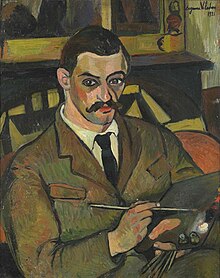
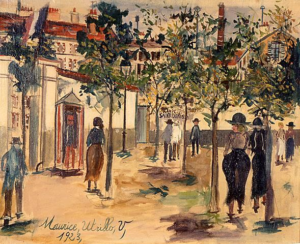
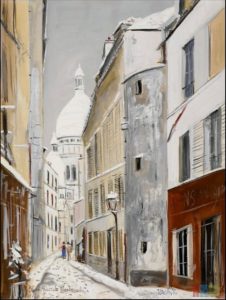
Sacré-couer
| Henry Miller | |
|---|---|

Miller in 1940
|
|
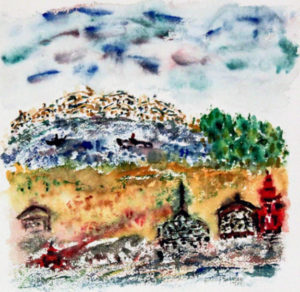 Today is the birthday of Henry Valentine Miller (Yorkville, Manhattan; December 26, 1891 – June 7, 1980 Pacific Palisades, Los Angeles); writer and watercolor artist. He was known for breaking with existing literary forms, developing a new sort of semi-autobiographical novel that blended character study, social criticism, philosophical reflection, explicit language, sex, surrealist free association and mysticism. His most characteristic works of this kind are Tropic of Cancer (1934), Black Spring (1936), Tropic of Capricorn (1939) and The Rosy Crucifixion trilogy (1949–59), all of which are based on his experiences in New York and Paris, and all of which were banned in the United States until 1961. He also wrote travel memoirs and literary criticism, and painted watercolors.
Today is the birthday of Henry Valentine Miller (Yorkville, Manhattan; December 26, 1891 – June 7, 1980 Pacific Palisades, Los Angeles); writer and watercolor artist. He was known for breaking with existing literary forms, developing a new sort of semi-autobiographical novel that blended character study, social criticism, philosophical reflection, explicit language, sex, surrealist free association and mysticism. His most characteristic works of this kind are Tropic of Cancer (1934), Black Spring (1936), Tropic of Capricorn (1939) and The Rosy Crucifixion trilogy (1949–59), all of which are based on his experiences in New York and Paris, and all of which were banned in the United States until 1961. He also wrote travel memoirs and literary criticism, and painted watercolors.
Miller married his first wife, Beatrice Sylvas Wickens, in 1917; their divorce was granted on December 21, 1923. While he was still married to Beatrice, Miller met and became enamored of a mysterious dance hall dancer who was born Juliet Edith Smerth but went by the stage name June Mansfield. They began an affair, and were married on June 1, 1924.
In 1930, Miller moved to Paris unaccompanied. Soon after, he began work on Tropic of Cancer, writing to a friend, “I start tomorrow on the Paris book: First person, uncensored, formless – fuck everything!” Although Miller had little or no money the first year in Paris, things began to change with the meeting of Anaïs Nin who, with Hugh Guiler, went on to pay his entire way through the 1930s including the rent for an apartment at 18 Villa Seurat. Nin became his lover and financed the first printing of Tropic of Cancer in 1934 with money from Otto Rank. She would write extensively in her journals about her relationship with Miller and his wife June; the first volume, covering the years 1931-34, was published in 1966. Late in 1934, June divorced Miller by proxy in Mexico City.

Cover
|
|
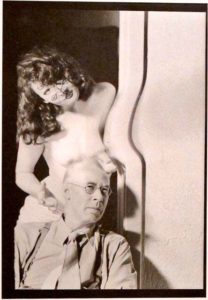
Miller and Anais Nin by Man Ray
Henry and June: From the Unexpurgated Diary of Anaïs Nin (full title Henry and June: From A Journal of Love: the Unexpurgated Diary of Anaïs Nin (1931–1932)) is a 1986 book, based upon material excerpted from the unpublished diaries of Anaïs Nin. It corresponds to the first volume of Nin’s published diaries, written between October 1931 and October 1932. “Henry and June” begins with discussion of Nin’s sex life and is full of her struggles and passionate relationship with husband Hugo, and then, as the novel/memoir progresses, other lovers. This, the first of currently five volumes of unexpurgated diaries, concentrates on her passionate involvement with Miller and his wife June. It is noteworthy that her diaries were able to spawn two dramatically different narratives about the same time period, both widely read and praised. The expurgated diary reveals Nin the philosopher and amateur but astute psychologist. The unexpurgated diary reveals a woman breaking out into wild sexual discovery. At the end of 1931, Nin found herself dissatisfied with being a timid, faithful wife to her banker husband, Hugh Parker Guiler. Nin and her husband contemplate the possibility of opening their relationship, and determine that it would threaten their marriage. However when Anais meets June Miller, she is drawn to her and perceives June to be the most beautiful and charismatic woman she has ever met. Nin pursues an extremely intense, ambiguous, sexually charged friendship with her. When June leaves, Nin becomes involved with Henry, and begins an uninhibited sexual and emotional affair with him, which prompts an intellectual and sensual awakening. A friendship is formed between the two that was maintained throughout both artist’s lives. The book was later filmed as Henry & June directed by Philip Kaufman, with Fred Ward as Miller, Uma Thurman as June, and Maria de Medeiros as Anaïs Nin. The movie, released in 1990, is notable as the first film to be released in the United States with an NC-17 rating.
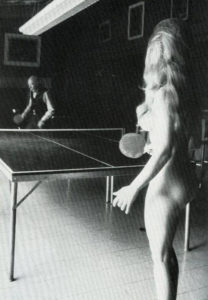
Miller and friend photo by Henri Cartier-Bresson
In 1944, Miller met and married his third wife, Janina Martha Lepska, a philosophy student who was 30 years his junior. They divorced in 1952. The following year, he married artist Eve McClure, who was 37 years his junior. They divorced in 1960, and she died in 1966, likely as a result of alcoholism. In 1961, Miller arranged a reunion in New York with his ex-wife and main subject of The Rosy Crucifixion trilogy, June.
In February 1963, Miller moved to Pacific Palisades, Los Angeles, California, where he would spend the last 17 years of his life. In 1967, Miller married his fifth wife, Hoki Tokuda.
Mac Tag

No Comments on "The Lovers’ Chronicle 26 December – rememberin’… – art by Maurice Utrillo – birth of Henry Miller"